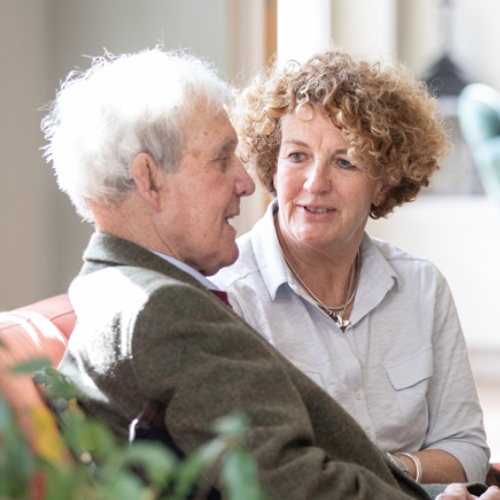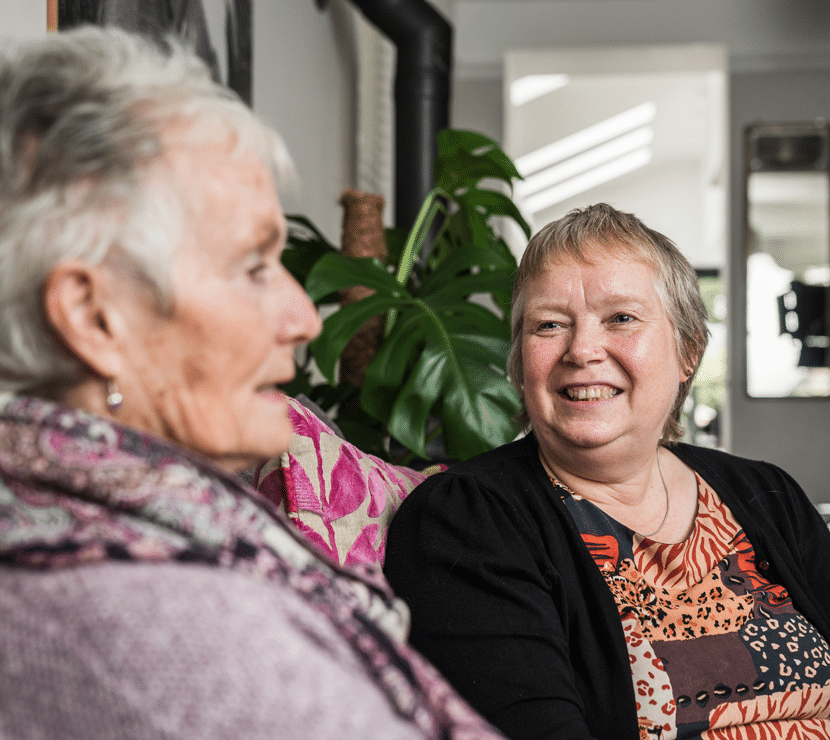End-of-life care is holistic support provided to people with life-limiting conditions and their loved ones. It is a form of palliative care offered to someone within the final weeks or months of their lives.
The focus of end-of-life care is to provide bespoke support to the individual so that they can live in comfort and dignity in the time they have left. End-of-life care goes beyond merely addressing physical needs; it is a holistic approach that considers the emotional, spiritual, and social aspects of a person’s well-being.
At Oxford Aunts, we understand that the end-of-life journey is a deeply personal and sensitive time for families. Our end-of-life care services are tailored to meet the unique needs of each individual, ensuring their comfort, well-being, and peace of mind.
With a wealth of experience in supporting individuals through end-of-life stages, our dedicated team of live-in carers is committed to providing exceptional care and support to both the individual and their family. We approach end-of-life care with the utmost respect, empathy, and understanding, recognising the significance of this final chapter in a person’s life.
Is end-of-life care right for you?
Deciding whether to pursue end-of-life care is a deeply personal and complex decision. At Oxford Aunts, we understand the importance of thoughtful consideration and open discussions when it comes to this important decision. If you or your loved one are living with a life-limiting illness, it may be helpful to assess whether end-of-life care is the right option for you.
Here are some points to consider when evaluating whether end-of-life care is appropriate:
Medical needs and comfort
End-of-life care focuses on providing comfort, pain management, and symptom relief for people with life-limiting illnesses. If you or your loved one require specialised nurse-led care, assistance with pain management, or support in managing symptoms, end-of-life care can offer a comprehensive approach to address these needs.
Personalised support and assistance
End-of-life care provides personalised support tailored to the unique needs and preferences of the individual. If you or your loved one require assistance with daily living, medication management, emotional support, or companionship during this challenging time, end-of-life care services can offer the necessary support and alleviate the burden on family members.
Emotional and spiritual support
Dealing with a life-limiting illness can be emotionally and spiritually taxing for individuals and their families. End-of-life care includes emotional support, counselling services, and spiritual guidance to help navigate complex emotions, provide comfort, and foster a sense of peace and acceptance during this transition.
Caregiver relief and respite
If you are a primary caregiver for a loved one with a terminal illness, end-of-life care can offer much-needed relief and respite. Professional caregivers can step in to provide support, allowing family members to focus on spending quality time with their loved ones and processing their emotions without the constant demands of caregiving responsibilities.
Honour personal preferences and wishes
End-of-life care prioritises honouring an individual’s preferences and wishes. If you or your loved one have specific desires regarding the place of care, pain management options, spiritual practices, or other aspects of end-of-life care, seeking professional support can help ensure that these preferences are respected and carried out.
Who provides end-of-life care?
End-of-life care in the UK is provided by a multidisciplinary team of health care professionals, support workers, carers and volunteers who work collaboratively to ensure comprehensive support is provided. Some key providers of end-of-life care include:
- General Practitioners (GPs)
- Specialist Palliative Care Teams
- Carers, like those from Oxford Aunts
- District Nurses
- Hospices
- Specialist Palliative Care Consultants
- Social Workers
- Caregivers and Support Workers:
- Charitable Organisations
What does end-of-life care include?
End-of-life care encompasses a range of supportive services designed to ensure comfort, dignity, and quality of life for people nearing the end of their lives. The goal is to address physical, emotional, social, and spiritual needs during this sensitive period.
While the exact services will vary between providers, some key components typically included in end-of-life care from Oxford Aunts are:
- Pain and symptom management: Effective management of pain and symptoms, such as discomfort, nausea, and shortness of breath, is a fundamental aspect of end-of-life care. Medications, therapies, and other interventions are utilised to alleviate distress and bring comfort.
- Emotional and psychological support: Emotional support is essential for both the individual and their loved ones. Counselling, therapy, and emotional guidance are offered to help address anxiety, grief, fear, and other complex emotions that can arise during this time.
- Spiritual and religious care: Recognising the diverse spiritual and religious beliefs of individuals, end-of-life care often includes support from chaplains, spiritual counsellors, or religious leaders who provide spiritual comfort and guidance.
- Personal care assistance: Assistance with daily living, such as bathing, dressing, grooming, and mobility, is provided to maintain personal hygiene and ensure comfort.
- Companionship and social support: Loneliness and social isolation can be prevalent during the end-of-life period. Carers offer companionship, engage in conversations, reminisce, and provide emotional support, helping people feel connected and valued.
- Bereavement support: End-of-life care extends beyond the individual’s passing, offering support to loved ones during the bereavement period. Grief counselling, support groups, and resources are provided to help family members cope with their loss and navigate the grieving process.
Is there funding available for end-of-life care?
When it comes to end-of-life care in the UK, there are various funding options available to support families during this challenging time. Understanding these funding sources can help alleviate some of the financial burdens that may be experienced during this time and ensure that people receive the necessary care and support they require.
Here are some funding options to consider:
NHS Continuing Healthcare (CHC)
NHS Continuing Healthcare is a funding package provided by the NHS for people with significant and ongoing healthcare needs, including end-of-life care. If an individual’s primary need is a healthcare need rather than a social care need, they may be eligible for CHC funding. This fully-funded package covers the costs of care, including medical equipment, healthcare professionals, and accommodation.
Personal Health Budgets (PHBs)
Personal Health Budgets are an option for individuals eligible for NHS Continuing Healthcare. They provide people with more control and flexibility over how their care needs are met. With a PHB, individuals receive a designated amount of money to spend on their care, allowing them to tailor and customise their end-of-life care according to their preferences.
Local authority funding
Local authorities offer funding for social care needs, which may include end-of-life care services. Depending on the person’s circumstances and financial means, the local authority may provide financial assistance or fully fund the required care. A needs assessment and a means test are typically conducted to determine eligibility for local authority funding.
As an established provider of funded care services in Oxfordshire, we have a wealth of experience of working with social care teams. Our strong understanding of the funding that is available and how families can access it ensures our care services can be provided as and when you need them, with all the reassurance that brings.
Arrange end-of-life care
We know through our experience of helping thousands of people who are living with a terminal diagnosis how distressing and upsetting it is for all involved. Your dedicated and sensitive Oxford Aunts carer respects that it is a very emotional time and is there to provide the compassionate care and support required not just for the person receiving care, but all the family.
They can manage any symptoms effectively, whilst meeting a person’s psychological needs ensuring all their wishes and choices in life are met. We ensure your dignity and comfort is at the forefront of all we do.
With our fully managed live-in care service families have reassurance at a time they need it most. Our palliative live-in home care is trusted by families across the country to really make a difference to someone living and receiving end of life care.
Get in touch with us about your end-of-life care needs
Our expert care advisors are here to help you understand the options available to you.





